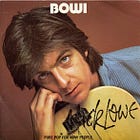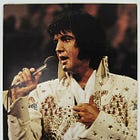Tune Tag #51 with Robert C. Gilbert of "Listening Sessions": Elvis Presley, Doors, Mink DeVille, Minnie Riperton, Smothers Brothers, Todd Rundgren
Tune Tag goes multi-media with Robert, as ground-breakers Elvis, The Doors, recent Hall-of-Famer Todd Rundgren join small-screen siblings, TV's Smothers Brothers! Hello, People!🙋♂️
Greetings, Robert! TAG! You’re IT!
Tune Tag is proud to welcome of Listening Sessions on Substack!
Music has been a constant in Robert’s life from the very beginning: His first memories are related to music and if he has gone a day, as Leonard Bernstein once put it, “without hearing music, playing it, studying it or thinking about it,” he doesn’t recall.
Writing about music has long been an ambition of his, and he’s been realizing it through his popular and well-regarded Substack, Listening Sessions. While he focuses mostly on older music, he tries to keep his ears as wide open as possible (take a glance at his record collection and you’ll see what I mean!), always ready to find something new in the most unexpected of places—maybe even something he can select for this edition of Tune Tag!
Last week, we had of Musings of a Broken Record over for tea’n’Tune Tag!👇
And, next week, we’ll throw open the gates to warmly welcome of If Ever You’re Listening!
Robert’s #1 song sent to Brad: Elvis Presley, “Gonna Get Back Home Somehow,” 1962
Robert’s rationale: While I try to keep my musical tastes as eclectic as possible, listening to my father’s collection of Elvis Presley records was the start of this lifelong musical education.
I have always felt that the music Elvis made in the ‘60s—especially the non-soundtrack recordings he made in Nashville—was him at his best, presenting a synthesis of all the strands of American music that spoke to him. Yes, Elvis had tamed his wilder side by the early sixties, but then the idea that he was a rock and roller above all else neglects the fact that his true ambition was to be an artist.
Well, enough sermonizing! Onto the song I picked:
I delight in throwing out deeper cuts in the Elvis catalogue, mostly to show that there is a whole lot more to savor than just the hits! “Gonna Get Back Home Somehow” is a classic Elvis album track, engineered/produced by Bill Porter. Recorded in March 1962 at RCA’s Studio B in Music City for the Pot Luck With Elvis LP, it is a polished frenzy. There is a lot going on.
You have two drummers, Buddy Harman and D.J. Fontana, and the main riff is doubled by tenor saxophonist, Boots Randolph and guitarist Grady Martin. There are two complementary guitar parts for Harold Bradley and Scotty Moore, while bassist Bob Moore is in there on the bottom. Pianist, Floyd Cramer, pounds away on the bridge, and on the almost-operatic climax at the end of each A section, the harmonies of The Jordanaires (with soprano Millie Kirkham on top, pictured below) are added.
Elvis anchors it all with a controlled and rich vocal. Few pop records in 1962 sound as big or as menacing as this one. “Gonna Get Back Home Somehow” was written by one of the Brill Building’s finest teams, Doc Pomus and Mort Shuman, who wrote a slew of Elvis’ best sixties sides, as well as hits by Andy Williams, Dion and the Belmonts, Fabian and The Drifters, to name just a few.
Front Row: A first-hand account of 1974-era Elvis at a show in Las Vegas:
Backstage: A scene similar to the following may have preceded the Vegas show in ‘74: Elvis with his entourage, prepping him before he steps onstage!
Brad’s song #1 sent to Robert: Mink DeVille, “That World Outside,” 1980

Robert’s response: Mink DeVille is the kind of group I’ve heard of, but really know nothing about. My first impression of “The World Outside” is the strong Springsteen vibe here—the yearning, the dreaming of two to make their own choices and, in so doing, make their own life. “Gonna Get Back Home Somehow” somewhat touches on that, but not with the poignancy felt here.
I wondered if the tenor saxophone part—another Springsteen connection—may have been played by none other than Boots Randolph. It is not. The tenor player here is Steve Douglas, a legendary studio player. Going online to confirm that led to who co-wrote the song with Willy: none other than Doc Pomus!
Brad’s rationale: Written by Willy DeVille and Doc Pomus, who co-wrote the Elvis song. Steve Douglas produced. Some of the album’s musicians used to play with Presley as part of his touring TCB (Taking Care of Business) band. On Deville’s Capitol Records sessions for the 1980 Le Chat Bleu LP were The King’s rhythm section of Ron Tutt (drums) and Jerry Scheff (bass).



![For animated GIFs — Brutal cat fight. [video] For animated GIFs — Brutal cat fight. [video]](https://substackcdn.com/image/fetch/$s_!X5mP!,w_1456,c_limit,f_auto,q_auto:good,fl_lossy/https%3A%2F%2Fsubstack-post-media.s3.amazonaws.com%2Fpublic%2Fimages%2F8ab8341e-7d28-4a0f-b84f-4735fac6cdbb_362x250.gif)





